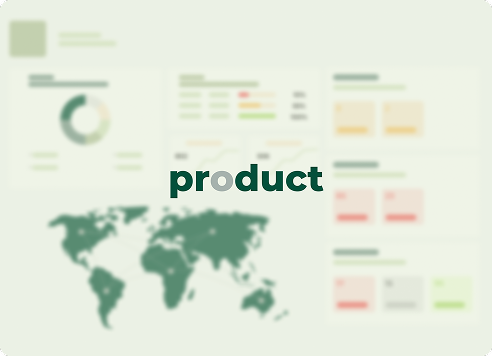This blog post focuses on key aspects of the EU Deforestation Regulation (EUDR) related to penalties and enforcement in cases of non-compliance. The EU requires all Member States to implement meaningful penalties, which has major implications for companies importing, exporting, or trading raw materials and products covered by the EUDR.
EUDR – A short introduction
The EU Deforestation Regulation (EUDR) is an important milestone in protecting the world’s forests and combating deforestation and forest degradation. The regulation requires businesses to ensure that the raw materials they trade are sourced legally and sustainably. The raw materials the EU aims to ensure are sourced legally and sustainably include coffee, cocoa, soy, palm oil, cattle, plantation wood fiber, and plantation rubber.
The EU adopted the EUDR on December 6, 2022, and it will come into effect at the end of 2025. Deforestation is one of the major causes of climate change and biodiversity loss—two of the most pressing environmental challenges we face today.
EUDR – Penalties
Since the introduction of the EUDR a new category has been added explaining the penalties of non-compliance under EUDR.
The purpose of this post is to provide an overview of the newly added category.
EUDR – A Brief Overview
-
10.1 What does it mean that penalties must be set “without prejudice” to Member States’ obligations?
Member States cannot simply impose penalties under EUDR alone – they must also comply with existing EU rules on environmental protection through criminal law, especially Directive 2008/99/EC.
This directive obliges EU countries to criminalise/penalize certain serious environmental violations. In other words: if a company knowingly or with gross negligence imports goods that contribute to illegal deforestation, the consequence may not only be a fine – in some cases, it may also lead to criminal penalties, such as prison sentences for those responsible.
-
10.2 What types of penalties can companies expect?
According to EUDR, penalties must be effective, proportionate, and dissuasive – but each Member State is responsible for defining how they are implemented. The regulation specifically mentions the following types of penalties:
-
Fines: These must be high enough to have a real impact – and not be seen merely as a cost of doing business. Fines can reach up to 4% of a company’s annual turnover in the EU, making it particularly serious for large actors.
-
Withdrawal of products from the market: If products do not comply, authorities can demand they be removed – both from store shelves and e-commerce platforms.
-
Confiscation of goods and profits: If a company has sold non-compliant products and made a profit, that profit may be confiscated. This also applies to stockpiles.
-
Marketing bans: Companies that repeatedly or severely breach the rules may be banned from marketing relevant products in the EU for a period.
-
Temporary suspension of permissions: National authorities may suspend a company’s registration in the digital EUDR system, effectively blocking its ability to operate legally.
-
10.3 Who is responsible for enforcement?
National authorities in each Member State are responsible for oversight and enforcement. They must:
-
Carry out risk-based checks – including both documentation reviews and physical inspections.
-
Cooperate with customs authorities, who play a key role in stopping non-compliant products at the border.
-
Use the EUDR information system, where companies are required to register their due diligence statements.
Additionally, Member States must report their enforcement efforts to the EU Commission, which monitors and evaluates how the rules are working in practice.
-
10.4 Do the rules apply only to producers?
No – the EUDR covers the entire supply chain:
-
Operators are companies placing a product on the EU market for the first time or exporting it from the EU. This includes producers, importers, or exporters.
-
Traders are companies reselling products already on the market – such as distributors, wholesalers, and retailers.
Both groups are required to ensure and document that products are deforestation-free, legally produced, and traceable down to the plot of land.
This means no company in the value chain is exempt, and all can be subject to penalties if found non-compliant.
-
10.5 Why should companies take the penalties seriously?
EUDR penalties are not symbolic. They have the potential to seriously impact a company’s bottom line. Any company dealing in relevant commodities must be prepared.
The consequences can include:
-
Fines – up to 4% of a company’s (potentially group-wide) EU turnover
-
Business disruption – goods may be seized, confiscated, or subject to a sales ban
-
Loss of trust from customers, investors, and partners
-
Reputational damage, especially if authorities or the media expose supply chain failures
-
10.6 What are the minimum requirements for penalties under EUDR?
EUDR does not merely allow Member States to impose penalties – it sets minimum standards for what national penalty systems must include. In other words: it is not optional to establish robust enforcement frameworks, and these cannot be merely symbolic.
The penalties must at minimum include:
-
Fines of appropriate magnitude – up to 4% of annual EU turnover
-
Withdrawal of products from the market
-
Marketing bans for non-compliant products
-
Confiscation of goods and financial gains
-
Exclusion from public procurement procedures and temporary suspension of access to the digital EUDR system
Furthermore, Member States must:
-
Publish information about breaches and decisions taken, unless there are strong reasons for confidentiality
-
Ensure that the penalties also apply to repeated or systematic breaches, with escalating consequences
This means companies should expect a high degree of transparency and enforcement. It is no longer enough to have sustainability policies or declarations of intent. Documentation, traceability, and active risk management are essential.
Stay updated with prduct.com
EUDR is complex, and companies are advised to seek guidance and stay updated to navigate the regulation’s details correctly.
Prduct.com offers a solution that simplifies EUDR compliance. We help you keep track of your HS codes and ensure compliance through automated and reliable data processing. Our platform provides a solution that directly integrates your data into the ‘TRACES’ information system.
In short we collect your data, conduct risk assessments of your entire supply chain, and help mitigate identified risks.




